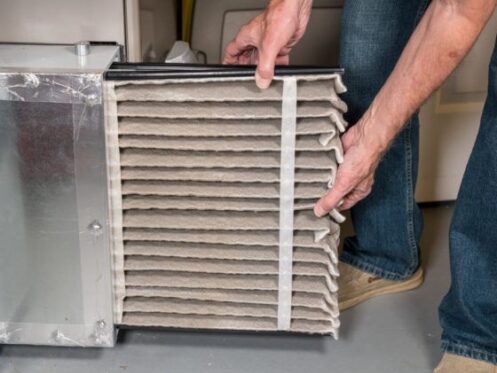Air quality experts recommend changing your air conditioner filter every one to three months. Air filters trap airborne particles such as dust, pollen, and pet dander, that can cause health issues. The effectiveness of air filters is measured through their minimum efficiency reporting value (MERV) rating. It ranges from 1-16, with higher numbers indicating more efficient filtration. Regular air filter changes ensure optimal performance and prevent clogging, which reduces airflow and strains the HVAC system. There are a number of factors that may determine the frequency of changing your air filters in your Denver, CO home.
Asthma or Allergies
If you or a loved one suffers from asthma or allergies, frequent air filter replacement reduces symptoms. A clean air filter traps pollen, dust, and other irritants. If you have pets or live in a dusty environment, replace your air filters monthly. It is also important to choose the right type of air filter for your specific needs. High-efficiency filters, such as HEPA filters, are especially effective for removing tiny particles that trigger asthma and allergy symptoms.
Children or Elderly Residents
Young children are more vulnerable to allergens since their immune system is not fully developed. Conversely, the human immune system functions less efficiently with age, so older people are more susceptible to airborne pathogens and respiratory complications. Changing your air filter often can help to prevent these issues. Filters trap and remove airborne particulates, which can cause allergic reactions. They also reduce the likelihood of respiratory-related issues and improve sleep because the air is clean and fresh.
Pets
As much as we love our furry friends, they can affect the indoor air quality in your home. Pet fur and dander can cause allergies and irritations to sensitive individuals. Pet owners should prioritize replacing their air filters monthly to mitigate these issues. Pet allergies trigger symptoms like sneezing, coughing, skin rashes, and respiratory difficulties.
Home Size
A home’s size significantly affects the types of air filters necessary for optimal air quality. Larger homes require more powerful air filters to remove particulates from the air adequately because larger homes contain more cubic feet of air and thus need more effective filtering methods.
Your Outdoor Environment
Living in an area with high levels of air pollution can cause harm to your health. While many people associate air pollution with outdoor activities, indoor air quality also suffers in these areas as the air from outdoors inevitably gets inside. One way to improve your home’s air quality is by often replacing your air filters.
Improved Indoor Air Quality
When the air filter clogs, it restricts clean air circulation throughout the house. It means that the filter no longer traps airborne pollutants such as dust, pollen, and smoke, reducing indoor air quality. Regularly changing your air filter can help prevent this, ensuring your home’s air is clean and healthy.
Increased Efficiency
Air filters trap dirt, dust, pollen, and airborne contaminants that build up over time. Clogged filters reduce the airflow in your home and make the system work harder to circulate air. When air filters are dirty or clogged, they reduce energy efficiency by up to 15%. It is also a good idea to have your HVAC system serviced annually by a professional service technician to ensure that there all parts are in good working order. Parts that require replacement can also reduce your system’s efficiency.
HVAC Lifespan
Maintaining your HVAC system is also crucial for ensuring that it lasts as long as possible. Dirty or clogged air filters strain your HVAC system, causing it to work harder and leading to breakdowns. When your system exceeds its capacity for extended periods of time, it accelerates wear and tear, which means that your system won’t last as long.
Lower Repair Frequency
The cost of repairing an older HVAC system is almost similar to purchasing a new unit if you calculate the number of times it breaks down. Replacing air filters and carrying out regular maintenance prevents damage. When you fail to replace your filters, you will eventually call your technician because your system will not maintain the correct temperature, and you may notice a foul odor or weird noises.
Different Types of Air Filters
The type of air filter that you choose for your HVAC system impacts your home’s air quality, energy bill, and health. There are various options to choose from, each with its unique characteristics and benefits.
Particulate Air Filters
These air filters capture particulates such as dust, pollen, spores, and small suspended particles. They trap the particles on a filter media, such as cotton or paper, usually made of varying-sized fibers. The larger particles are trapped on the surface of the media, and smaller particles become embedded in the fibers.
Electrostatic Air Filters
Much like a magnet, these air filters use an electrostatically charged material to draw particles into them. The positively charged material attracts negatively charged particles, trapping them inside and preventing them from entering your indoor air. Unlike particulate filters, electrostatic filters do not require regular replacement.
Carbon Air Filters
These air filters contain activated carbon, which absorbs odors, gases, and volatile organic compounds (VOCs). It makes them effective in reducing indoor pollution caused by smoke and chemical odors. Even commonly used household products like paint and cleaners can release VOCs over time.
HEPA Air Filters
High-efficiency particulate air (HEPA) filters capture at least 99.97% of airborne particles, making them the most effective type of air filter available. They use a dense fiber matrix to trap particles and capture even the tiniest particles. HEPA filters do require regular replacement because of their dense construction, and some HEPA filters can make your HVAC system work harder to pass air through them, so it’s a good idea to get a technician’s opinion about which HEPA filter is optimal for your home.
Ultraviolet (UV) Air Filters
These air filters kill airborne microorganisms like bacteria and viruses using UV light. While UV air filters work well in killing these microorganisms, they do not remove other particles from the air. Because of this, UV filters are often combined with another type of filter to provide a complete filtration system.
Ionizer Air Filters
These air filters use an electrical charge to attract airborne particles and trap them on a collection plate. Ionizers reduce the amount of airborne particles, but they are not as effective as other types of filters. They also do not remove odors or gases from the air, so they are not recommended for people with asthma or allergies.
Media Air Filters
Media filters provide greater efficiency than standard filters because of their high MERV rating. Media air filters provide high-level filtration without negative effects like low airflow. Because of the big surface area, media filters successfully prevent static pressure. They are easy to maintain and seal the filtered dirt so that it is not expelled back into the house. Media filters are commonly regarded as cost-effective because they do not require frequent maintenance. However, do not attempt to install the media filters on your own; call a professional from Summit Heating & A/C.
Trust Us to Replace and Maintain Your Air Filters
Air filters promote healthy air quality and efficient heating and cooling systems. Leave it to Summit Heating & A/C to replace and maintain your air filters, ensuring your air system functions optimally. We also offer heating and cooling solutions such as heat pumps, furnaces, and air conditioners. Our team of professionals conducts installation, repair, and maintenance services in Denver, CO. Contact Summit Heating & A/C for more information.


